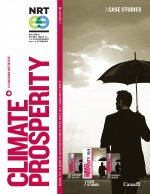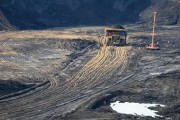Over the past several years, Prime Minister Stephen Harper and his government have been doggedly selling Canada as a “clean energy superpower”. While those words have always rung hollow to anybody tracking the global rise of the $1 trillion clean energy economy, after yesterday’s federal budget they simply ring false.
There are two dimensions to clean energy. The first relates to the need to “clean up” non-renewable sources of energy like coal and the oilsands by reducing their environmental and climate change impacts. The second, and more important, dimension relates to the opportunity to compete in the burgeoning marketplace of renewable energy production and more efficient energy consumption.
The federal budget fails in both dimensions: It will take Canada several steps further from environmentally responsible development of fossil fuel resources like the oilsands, while simultaneously undercutting progress on renewable energy and efficiency.
Assessing the cuts to environmental assessment
When it comes to assessing and addressing the environmental impacts of oilsands development, things are poised to go from bad to worse. In its 2010 review of the environmental and health impacts of the oilsands sector, the Royal Society of Canada found that the environmental regulatory capacity of the Alberta and federal governments was lacking, and characterized the environmental impact assessment process used by regulators to make public interest decisions as “seriously deficient” and falling short of international standards.
But rather than providing adequate resources to fix the problem, the Harper government is slashing the Canadian Environmental Assessment Agency’s budget by 40 per cent and imposing arbitrary new timelines for the regulatory review of major industrial projects. According to media reports, Natural Resources Minister Joe Oliver has confirmed those changes will be applied to reviews on projects that are already underway, like the Northern Gateway pipeline review. Moving the goal posts on a current review process is unfair to the regulators, intervenors and even the project proponent.
After spending 20 years working on oilsands issues — gaining real-world experience that includes reviewing in detail the environmental assessments for all the major projects and consulting for some oilsands producers on innovative technologies — the Pembina Institute knows that effective environmental assessment is a cornerstone of informed, public interest decision-making. From our perspective, a robust environmental assessment asks the right questions, engages the right stakeholders, and uses the best data and scientific analysis.
Apparently, however, the federal government’s new standard is not how well environmental assessment is done, but how fast. If this, my friends, is “responsible resource development” (the latest catchphrase out of Ottawa) then we’re in serious disagreement about the meaning of the word “responsible.”
Austerity for some, but little for oil and gas companies
The budget proudly notes that, in 2009, Canada and other members of the G-20 committed to “rationalize and phase out over the medium term inefficient fossil fuel subsidies.” Over the past several years the government has made some progress in doing so, phasing out tax preferences for oilsands producers relative to the conventional oil and gas sector, for example, but the Finance Minister’s advisors have recommended the government go even further.
With Budget 2012, the government inched forward by announcing it would phase out the Atlantic Investment Tax Credit for oil and gas and mining and the Corporate Mineral Exploration and Development Tax Credit. When the subsidies are fully phased out in 2016, the change will save Canadians foregone tax revenue (per year) of $85 million and $30 million, respectively.
It’s a positive step, but relative to the size of the prize (i.e., total federal subsidies to oil and gas), eliminating these tax credits is just scratching the surface. A 2010 study (PDF, see Table 5) by the International Institute for Sustainable Development (IISD) found that federal subsidies to oil in Alberta, Saskatchewan and Newfoundland and Labrador totaled nearly $1.4 billion in 2009. There remains a significant amount of foregone tax revenue from the oil and gas sector.
Not only is this preferential tax treatment no longer necessary, but it also amplifies the asymmetric economic impacts that already exist between resource-rich regions and other parts of Canada. For this reason (among others), the OECD’s 2008 economic survey of Canada recommended consideration of a phase-out of exploration and development expenses (which IISD estimated in 2009 at $233 million and $478 million, respectively).
It doesn’t pay to give advice that isn’t wanted
 While it is disappointing, it’s hardly surprising that the government has decided to shut the doors of the National Roundtable on the Environment and the Economy (NRTEE). Originally established by Prime Minister Mulroney and chaired by David Johnston (now Canada’s Governor General), the NRTEE has been “the only national organisation with a direct mandate from Parliament to engage Canadians in the generation and promotion of sustainable development advice and solutions.”
While it is disappointing, it’s hardly surprising that the government has decided to shut the doors of the National Roundtable on the Environment and the Economy (NRTEE). Originally established by Prime Minister Mulroney and chaired by David Johnston (now Canada’s Governor General), the NRTEE has been “the only national organisation with a direct mandate from Parliament to engage Canadians in the generation and promotion of sustainable development advice and solutions.”
The NRTEE has been the single greatest source of constructive, third-party research and advice on climate change policy to the federal government in Canada. For example, its Climate Prosperity project generated a wealth of reports including:
Wiping out this respected think-tank while Canada still lacks a credible plan for achieving its own 2020 greenhouse has reduction targets will make it that much harder for Canada to do its fair share in addressing the climate challenge.
Hardly a penny to spare for renewable energy and efficiency
Under the “ecoENERGY” banner, the federal government had a range of incentives supporting renewable energy, efficiency, technology and innovation. Despite the growing popularity and impact of these programs, in successive budgets the government has allowed them to dwindle and even disappear for new projects.
If you were scanning yesterday’s budget with an eye for renewable energy and efficiency, as we were, you could be forgiven if you missed the three times the word “renewable” popped up. The budget did, however, include a proposed expansion of the accelerated capital cost allowance for waste-fuelled energy equipment.
Price tag? The government estimates this will cost about $1 million per year for the next two years. In 2010 we estimated that Canada needed a tenfold increase in renewable power production to hit the federal government’s 2020 target of producing 90 per cent of its electricity from sources that don't produce greenhouse gas pollution. Suffice it to say that this budget doesn't reflect the level of effort that’s needed to achieve that target.
The word “efficiency” popped up quite a bit more, but mostly with regard to topics other than energy (border efficiency, tax efficiency, efficiency of government operations, etc.). While in January 2012 the government committed $195 million over 5 years to ecoENERGY Efficiency Initiatives, no new energy efficiency initiatives were identified in the 2012 budget, and the ecoENERGY Retrofit—Homes program (which encouraged efficiency improvements in Canadian homes), was unexpectedly wrapped up early this year. In 2007 the Council of Energy Ministers set a target of retrofitting every home in Canada by 2030, but the new federal budget gets us no closer to that target.
The sum of the budget
It’s clear the government has spared hardly a penny for clean energy, choosing instead to encourage and expedite decidedly irresponsible energy production. When you roll it up, Budget 2012 is a near bust for clean energy and a step backwards in protecting the environment for Canadians.










